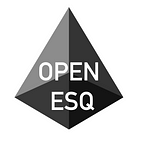Disclaimer: This is not legal or financial advice. It is for demonstration purposes only, and does not mean to represent any claim or opinion about the law, nor does it create an attorney / client relationship.
Hello again. It’s everyone’s favorite ring peddler, Rob, back with the final part of this series. To recap, in Part 1 we created an ERC20 token called “URING” that’s supposed to represent the purchaser’s right to redeem a ring from us.Part 2 introduced the reader to Uniswap’s dynamic pricing method, and argued that it’s ideal for scarce products.
Now comes my favorite part, which is creating seller liability. As you probably know, “liability” means being responsible for something by law. Normally people try to avoid liability, but without it nobody will trust us to deliver our product. We need a warranty, and OpenLaw is the perfect place to draft one.
We start off by going to openlaw.io and creating a free account.
Once logged in, we see a number of options available, including a search bar that lets us search OpenLaw’s agreements library. We’ll want to start here because there’s no point of creating a new agreement from scratch if one already exists.
We start to type in “warranty” and nothing comes up.
But that’s okay, we’ll just create one. It’ll be fun! At the upper right-hand corner of the page, we click on the menu button and choose “Start a New Template.”
We see this page.
Let’s just give it a title, and briefly state what we intend to do.
If you can’t read the text, it just says the following:
Rob warrants that URING tokens represent the right to receive a ring. Rob further warrants that, upon redemption, these rings will be shipped to any address in the continental United States using standard shipping.
Nothing fancy. We then click the “Save” option above the title.
Then just like that, the agreement is saved on OpenLaw. It now gives us the option to go “Back,” which we click on.
And this gives us a view of the warranty as a draft.
We have our Warranty! Now, I know what you’re thinking:
“Rob, you promised us mind-blowing, but this is like a Google doc.”
Fair enough. Let’s click the “Edit” button and have a little fun.
Using OpenLaw’s Markup Language we can turn “Rob” into a seller variable, “URING” into a token variable, and “ring” into a product variable.
Now when we click “Save” and “Back” we see this screen.
Now we have a re-usable template. But that’s not all! Back to the edit mode, we can add a different type of variable that lets everyone know the seller’s ETH address, and the token’s ETH address. Also, we’ll add a headline with two ** on each side, and an introduction. If we add a ^ before the text, it’ll give us numbering.
We then can center the text to make it look fancy.
Obviously it’s getting a little more complicated, but bear with me. We click “Save” and “Back” and start to see this come together.
There’s so much more we could do with the Markup language, but let’s just add one more important thing: the signature. Back to edit mode add the Seller’s email variable in the following way: [[Seller Email: Identity | Signature]]
We click “Save” and “Back” and now we’re ready to fill this bad boy out and sign it.
We click “Send Contract.”
Since we are a party to this agreement, in fact the only party, OpenLaw gives us the option to sign right here. If we weren’t a party, an email containing the signing link would be sent to the parties listed with the “:Identity | Signature” variable.
We click the drop down, which gives us the option to sign with MetaMask.
We click “Sign Agreement” and MetaMask pops up with a notification.
We confirm and wait while this transaction processes, and then…
Our signature for this warranty is now recorded on the Ethereum (Rinkeby) blockchain. We have now linked URING’s contract address to an OpenLaw warranty that was signed with my MetaMask. Take a bow, everyone. Just to be fancy, I printed it out on a certificate.
This is just a simple taste of what OpenLaw can do. A more detailed demonstration could include uploading a picture of the product, including the seller’s business address, and other fancy stuff. But we’ll have to save that for another day, along with going about redeeming and burning tokens.
If you want to have a look at the warranty and make your own edits, it’s right here. Thanks for reading and stay tuned for more fun with Open, Esq.
If you’d like to support our work, you can buy a URING by visiting Uniswap and searching for the token with the following address: 0x8baaabee4e60982b128b5339a998ee748eca4cff
